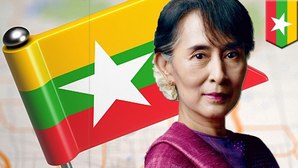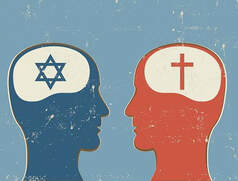
It’s quite interesting to look at the world in terms of the stories that seem to be a motivation for action. In Myanmar, for example, the prevailing story seems to be that only Buddhists have a right to citizenship and a national identity. Hence the Rohingya Muslims are aliens with no official recognition or right to be in Rakhine State even though they had a presence there before Burma was established. To ensure the safety, security and purity of Myanmar, as well as the Buddhist religion, they should go. What’s particularly distressing about this is that the persecution of the Rohingya is led by a group of Buddhist monks, known for their militancy rather than the wisdom and compassion which is central to Buddhist teaching. These monks tell a story that Buddhism is in danger, that Muslims are ready to take over the country, that Myanmar will only be great again once the Muslims have gone. And yet Muslims are a minority – something like 4% in a country where 90% are Buddhist and from what we see on television poor and powerless.
The monks in Myanmar are not the only militant Buddhists – Sri Lanka, Thai Land, Tibet and Japan in the past. We shouldn’t be surprised – people are people with all their complexities as religions are religions with their own set of complexities. There’s a tendency in the West to idealise Buddhism I think. It promises peace and happiness, offers a meaningful practice, seems more spiritual than other religions. It benefits in the west from being a minority faith where its institutionalisation is not as obvious as its spirituality but it’s a religious institution like other religions, with its own story, its own oppressions and liberations. Once it becomes married to a nationalistic outlook it can be as dangerous as other oppressive regimes.
The present situation in Myanmar has highlighted the position of Aung San Suu Kyi – once hailed as a human rights activist and admired for her determination and courage in the face of an oppressive regime but now castigated because of her silence over the Rohingya. She too will have a narrating self that gives her a story that influences her actions. The world thought it knew that story but obviously not. Aung San Suu Kyi always underlined the fact that she was a politician, not a human rights activist. She sees the world politically so we can only guess, as some commentators have, that her story is that to speak out would antagonise the military, the Buddhist monks and a majority of the population, leading perhaps to her downfall which no doubt in her opinion would not be good for her country. Does her narrating self allow her to deny the reality and experience of the Rohingya, their terrible suffering and persecution. From what she has said it seems it can and does, even to the point of suggesting that the suffering of the Muslims is exaggerated and misreported.
How dangerous stories can be and we see many examples of them in the speeches of the President of the USA, in the belligerence of North Korea and the violence of ISIS. But stories can be changed. An example of this is the story that Christianity, or at least the Catholic version of it, tells itself about the Jewish community. For centuries the story was that Jews were God-killers, blind to the truth, rejected by God in favour of the Christian community. It led to great persecution, suspicion, fear, hatred even. And it all changed in what seemed like the twinkling of an eye. It happened at the Second Vatican Council when the Document on the Church’s Relations with Non-Catholic Religions was published, promulgated and disseminated. There are only 5 paragraphs but the longest one, section 4, is given over the Church’s relations with the Jewish people. It recognises that Jews are not to be held responsible for the death of Jesus, that God never goes back on his promises, that Jesus and the first apostles were all Jews, that Christianity has a familial relationship with Judaism and has indeed grown out of it. It’s this new story that has allowed for friendships and relationships between the two faiths to grow and flourish. It has allowed the Jewish community to acknowledge the importance of Jesus as a member of their community, to acknowledge Christianity as a power in spreading the word of the God of Abraham, Isaac and Jacob.
The Vatican document was a real turning point, one that changed the story of many centuries and led to a new way of being with one another. It is a continuing sign of hope that such changes do and can happen. We need more of them in our world today.



 RSS Feed
RSS Feed
